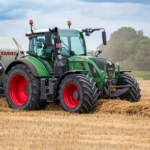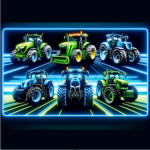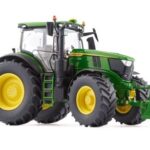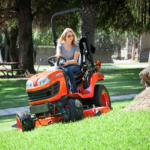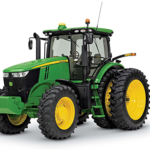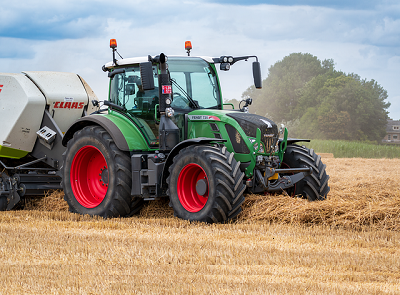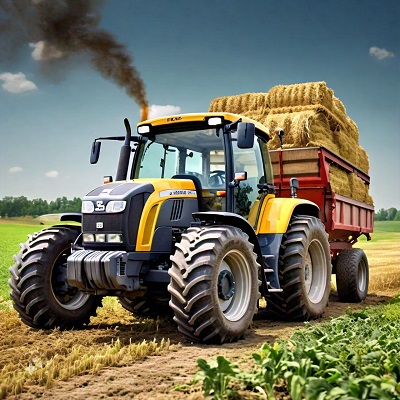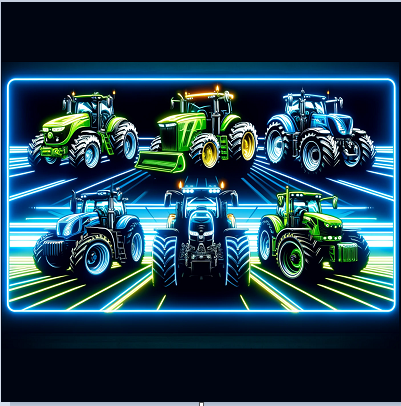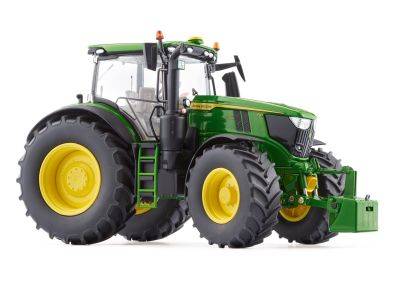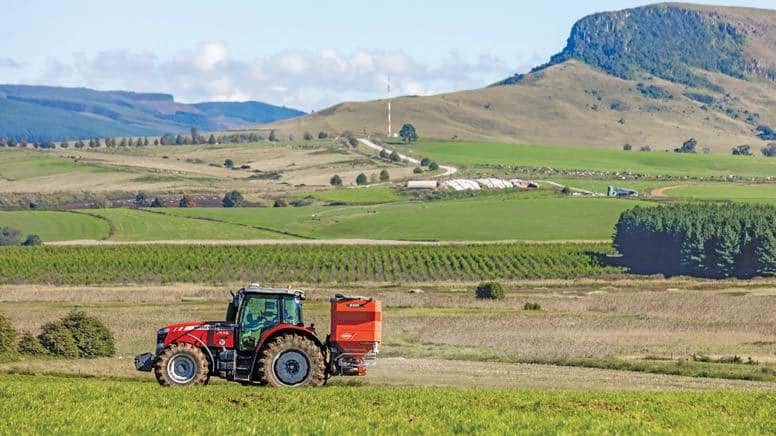
Essential Machinery for Modern Farming
The agricultural sector relies heavily on dairy farming to supply necessities like cheese, yoghurt, and milk. Reliable and effective equipment is becoming more and more necessary as dairy farms grow and evolve. Often referred to as the “backbone of the farm,” tractors are essential for managing the numerous duties needed to keep a dairy operation profitable and sustainable. This article discusses the value of tractors in dairy farming, what characteristics are important to search for, and which tractors are appropriate for these types of operations.
The Integral Role of Tractors in Dairy Farming
- Providing Livestock with Food
Feeding animals is one of the main functions of tractors on dairy farms. Feed waggons or front-end loaders on tractors provide for the efficient distribution and transportation of feed to cows. By doing this, you can be sure that the animals are getting all the nutrients they need to stay healthy and produce a lot of milk. Establishing a regular supplying schedule is essential for dairy cattle, and controlled delivery systems that are typically powered by tractors make this possible. - Management of Manure
On a dairy farm, good manure management is crucial to preserving sanitation and averting disease outbreaks. This technique improves pasture quality and supports sustainable farming methods in addition to aiding in waste management and recycling nutrients back into the soil. - Work in the Field and Crop Management
For a variety of fields chores, such as tilling, planting, harvesting, and ploughing crops used as dairy cattle feed, tractors are an absolute necessity. The production of high-quality fodder and grains—the main components of a dairy cow’s diet—requires these efforts. Keeping a consistent supply of a diet high in nutrients has a direct impact on milk production, both in terms of quantity and quality. - Moving and Transporting
Frequent movement of supplies, machinery, and occasionally animals is necessary for dairy farms. Tractors using trailers are an effective way to move commodities throughout the farm, including as bedding, milk, and fertiliser. This skill boosts overall agricultural efficiency and lowers labour costs. - Maintenance and Cleaning
Dairy farming depends heavily on environmental cleanliness. Tractors with tools, scrapers, and other attachments are used for cleaning feeding grounds, passageways, and barns. Frequent cleaning guarantees adherence to sanitary regulations and contributes to the herd’s continued health.
Essential Features of Tractors for Dairy Farms
When selecting a tractor for a dairy farm, there are several critical features to consider:
- Strength and Efficiency
A tractor’s power, expressed in horsepower (HP), dictates its capacity to carry out certain tasks. Tractors used on dairy farms usually need to be powerful enough to move large loads and run machinery like ploughs, feed waggons, and manure spreaders. The ideal tractor normally has between 75 and 150 horsepower, based on the scale of the farm. - Flexibility and Connections
For a dairy farm, versatility is an important consideration when selecting a tractor. The ability to connect and operate a wide range of equipment and attachments, such as loaders, mowers, and spreaders, enhances the functionality of the tractor. For dairy operations, quick-attach systems and front-end loaders are very helpful. - Fuel Economy
An important factor in any farm operation is fuel efficiency. Improved fuel efficiency in tractors can cut operating expenses and their environmental effect. Modern tractors are powered by advanced technologies that optimise fuel economy. - Adaptability
Because dairy farms frequently have limited space, their machinery needs to be able to move efficiently within barns, across feeding areas, and around other farm structures. In these kinds of situations, tractors with a small profile, four-wheel drive, and a tight turning radius are perfect. - Ergonomics and Comfort
Because tractor operators frequently work long shifts, ergonomics and comfort are crucial. Elements like temperature control, seat modification, and user-friendly control layouts can reduce operator fatigue and boost productivity. - Dependability and Sturdiness
Reliable and long-lasting tractors are necessary for dairy farming operations. The equipment should be robust enough to endure numerous malfunctions and be able to function in a variety of environments. Brands having a solid track record of quality and after-sale assistance are usually favoured.
Best Tractors for Dairy Farms
John Deere 6M Series
John Deere is a renowned name in agricultural machinery, and the 6M Series is well-suited for dairy farms.
Key Features:
- Engine: Up to 175 HP
- Transmission: PowerQuad™ Plus or AutoQuad™ Plus
- Hydraulics: High lift capacity with multiple SCVs
- Comfort: Spacious cab with ergonomic controls
Why It’s Great:
- Versatility: Compatible with a wide range of attachments
- Durability: Built to withstand rigorous farm operations
- Technology: Equipped with advanced farming technology for precision agriculture
New Holland T5 Series
The New Holland T5 Series combines power and comfort, making it ideal for dairy farming tasks.
Key Features:
- Engine: 99 to 117 HP
- Transmission: Electro Command™ semi-powershift
- Hydraulics: High-capacity hydraulic system
- Comfort: Horizon™ cab for excellent visibility and comfort
Why It’s Great:
- Efficiency: Fuel-efficient engines with ECOBlue™ technology
- Maneuverability: Compact design for tight spaces
- Versatility: Suitable for a variety of farm tasks
Kubota M6S-111
Kubota’s M6S-111 is designed for both performance and efficiency on dairy farms.
Key Features:
- Engine: 114 HP
- Transmission: Fully synchronized main and shuttle transmission
- Hydraulics: Powerful hydraulic system with multiple ports
- Comfort: Deluxe seat and ergonomic control layout
Why It’s Great:
- Fuel Efficiency: Efficient engine performance
- Reliability: Known for its durability and low maintenance
- Compact Design: Ideal for maneuvering in confined spaces
Massey Ferguson 5700SL Series
Massey Ferguson’s 5700SL Series offers advanced features and reliability for dairy farming.
Key Features:
- Engine: 100 to 130 HP
- Transmission: Dyna-4 or Dyna-6 semi-powershift
- Hydraulics: Advanced hydraulic system with high lift capacity
- Comfort: Spacious cab with excellent visibility
Why It’s Great:
- Technology: Equipped with precision farming technologies
- Versatility: Multiple attachment options
- Durability: Built to last with robust construction
Case IH Farmall 100A Series
Case IH’s Farmall 100A Series is known for its ruggedness and efficiency.
Key Features:
- Engine: 110 to 140 HP
- Transmission: Synchronized mechanical shuttle
- Hydraulics: High-flow hydraulics with multiple ports
- Comfort: Ergonomic cab design with intuitive controls
Why It’s Great:
- Powerful Performance: Strong engine performance for heavy-duty tasks
- Reliability: Trusted brand with excellent after-sales support
- Versatility: Ideal for various dairy farming operations
Choosing the Right Tractor for Your Dairy Farm
- Evaluate Your Requirements
It’s critical to evaluate the unique requirements of your dairy farm before making a tractor selection. Think about your operation’s scale, the kinds of jobs you must complete, and the attachments you will need. - Assess the Environment
The kind of tractor you require may vary depending on the topography of your land. Tractors with strong traction and four-wheel drive are ideal for steep or uneven terrain. Larger tractors with more horsepower might be better suited for broad, level fields. - Considering the Budget
Budget is a major consideration when buying farm equipment. Purchasing a high-quality tractor is crucial, but it’s also critical to strike a balance between price and features. Take into account the initial purchase price as well as the ongoing expenses for gasoline, upkeep, and repairs. - Examine and contrast
Test-drive various tractor models whenever you can to assess each one’s ease of use, comfort, and performance. Analysing features and feedback from other dairy farmers can yield insightful information as well. - Post-purchase Assistance
Reliable after-sale assistance and maintenance are essential to preserving the functionality of your tractor. Select manufacturers and retailers that provide thorough guarantees, readily available parts, and attentive customer support.
The Future of Tractors in Dairy Farming
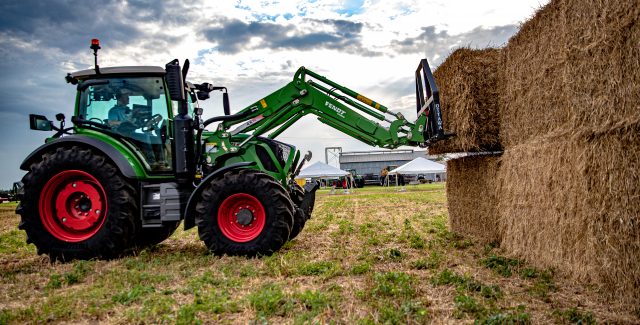
- Accurate Farming
Dairy farming is changing as a result of the incorporation of precision agriculture technologies. Ag activities can be carried out more precisely and effectively thanks to tractors that are fitted with sensors, GPS, and data analytics. With the use of these technology, crops can be managed more skillfully, feed distribution optimised, and soil health monitored. - Self-governing Tractors
The arrival of autonomous tractors holds great promise for transforming agricultural practices. With the ability to complete repetitive tasks without human assistance, these self-driving tractors can increase productivity and lower labour costs. Autonomous tractors, albeit still in their infancy, mark a substantial advancement in agricultural technology. - Ecological Methods
In agriculture, sustainability is becoming more and more crucial. More and more people are choosing tractors that promote environmental activities, such as lowering emissions, using less fuel, and working with organic agricultural methods.
Conclusion: Enhancing Dairy Farm Operations with the Right Tractor
Dairy farms cannot function well without tractors because they have the strength and adaptability to perform a variety of jobs. Efficient and productive work can be greatly increased with the correct tractor, which can be used for anything from fieldwork and supply transportation to managing manure and feeding cattle.
Important factors to take into account when choosing a tractor for your dairy farm are power, adaptability, fuel efficiency, and dependability. Reputable manufacturers like Massey Ferguson, John Deere, New Holland, Kubota, and Case IH provide models that are well-suited to the particular requirements of dairy farming.
With advancements in precision agriculture, independent machinery, and sustainable methods, the future of tractors in the dairy industry is bright.
